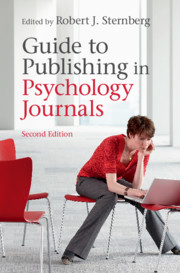Book contents
- Guide to Publishing in Psychology Journals
- Guide to Publishing in Psychology Journals
- Copyright page
- Contents
- Contributors
- Preface
- Part I Kinds of Articles
- Part II Parts of Articles
- Part III The Journal Submission and Resubmission Process
- Part IV Systemic Issues
- Chapter 19 Transparent Science
- Chapter 20 Open Access
- Chapter 21 Ethical Considerations in Submitting Articles
- Part V Conclusion
- Index
- References
Chapter 20 - Open Access
from Part IV - Systemic Issues
Published online by Cambridge University Press: 19 November 2018
- Guide to Publishing in Psychology Journals
- Guide to Publishing in Psychology Journals
- Copyright page
- Contents
- Contributors
- Preface
- Part I Kinds of Articles
- Part II Parts of Articles
- Part III The Journal Submission and Resubmission Process
- Part IV Systemic Issues
- Chapter 19 Transparent Science
- Chapter 20 Open Access
- Chapter 21 Ethical Considerations in Submitting Articles
- Part V Conclusion
- Index
- References
- Type
- Chapter
- Information
- Guide to Publishing in Psychology Journals , pp. 238 - 250Publisher: Cambridge University PressPrint publication year: 2018

